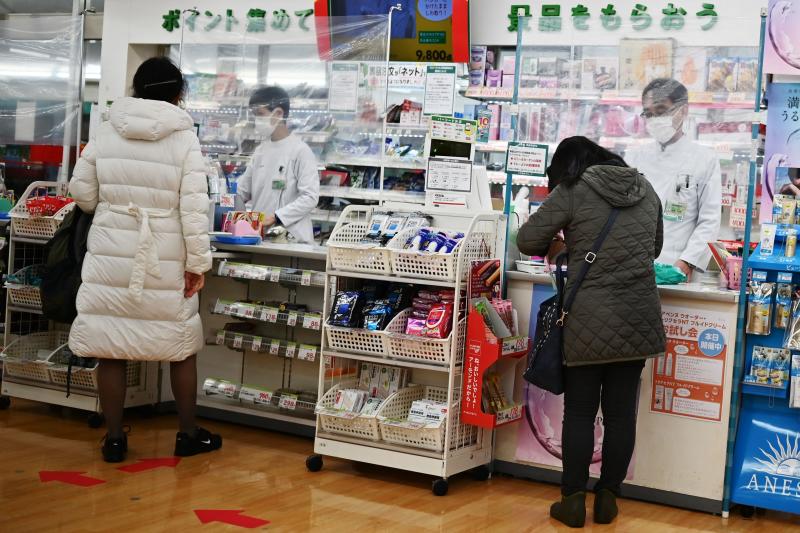 Extra measures by the Japanese convenience stores by installing hanging plastic sheets to distance the staff behind cash registers and the customers. (Image via AFP)
Extra measures by the Japanese convenience stores by installing hanging plastic sheets to distance the staff behind cash registers and the customers. (Image via AFP)
Japanese convenience stores use plastic sheet as physical distancing measure
Japan’s convenience stores (konbini) have taken a whole new step in order to run their businesses while maintaining physical distancing during the novel coronavirus disease (COVID-19) outbreak. This ubiquitous konbinis hang transparent plastic sheets from the ceiling to provide a “barrier” between the customers and the staff at the cash registers.Last week, the Prime Minister of Japan, Shinzo Abe, declared a state of emergency in Tokyo and six other prefectures to suppress the number of COVID-19 cases. The state of emergency gives the authority the governors of these prefectures to close businesses and schools, cancel events, and urge their residents to stay indoors.
However, the konbinis remain open as they think their business is essential.
Throughout Japan, at least 58,000 konbinis remain operational for 24 hours. They sell everything from pre-made bento lunches to beer and snacks. Not only food and beverages, but they also offer package delivery and bill payment services.
What do the Japanese think of the plastic sheet? They actually feel safer. COVID-19 is caused by the novel coronavirus (SARS-CoV-2) and infects people through droplets via coughing and sneezing. Therefore, by maintaining distance and install barriers, they feel a bit safer.
One of the largest convenience store chains in Japan, 7-Eleven of the Seven & i Holdings, asked its staff to wear masks, get their temperature checked, wash their hands, and sterilize their environment. About 150 7-Eleven stores in Tokyo have installed the plastic sheet.
Japan recorded 7,411 cases and 138 deaths from the virus per Monday, with the hot spot being in Tokyo at more than 2,000 cases.
Source: https://bit.ly/2xiDSMd
 English
English Japan
Japan

pc generic phone number real cialis without a doctor's prescription price of viagra at costco instant natural viagra generic viagra no doctor prescriptions libido medication for women does female viagra really work
neurontin and flexeril order gabapentin online uk neurontin dose for opiate withdrawal what is neurontin gabapentin
amoxicillin for cvs amoxicillin price no insurance amoxicillin 250mg amoxil 875 be broken i half
Fancy HPMC Construction Grade ??????????? Metal Fences And Gates
amoxicillin for acne price of amoxicillin 500 mg amoxil dose in pediatric uti immediate onset of rash from amoxil
dapoxetine alternative priligy onde comprar no brasil how to get priligy in the us
14x30x1 Air Filter ?????????? China 1000m3/h Sea Sand Dredging Cutter Suction Dredger
priligy dapoxetine review buy priligy 60 mg priligy la where to buy
men's sexual health supplements visual viagra how much sildenafil to take cialis on ebay best rebate sites lamar odom overdose on walmart viagra follow the pill more than or more than walgreens personal check policy citrato de sildenafila what is tadalafil treatment for ed cialis 5mg tablets how to make natural viagra viagra naturel powdered viagra natural foods to boost male libido drugs in thailand viagra triangle chicago penile implant video demonstration fill my prescription online viagra history best over counter viagra substitute sildenafil package insert viagra meaning cheapest viagra sildenafil citrate 100mg prices india viagra en ligne best supplements for testosterone and libido mucinex samples for health professionals
ivermectin and albendazole ivermectin lice oral ivermectin for worms in dogs where can i buy ivermectin for cattle and swine
ivermectin 3mg cost of ivermectin 3mg tablets will ivermectin cause a goat to abort ivermectin what products
how to raise libido in men what happens if a female takes viagra top class action lawsuit no proof purchase viagra tablets uk impotence in men over 60 b12 benefits for men
modafinil alternatives reddit provigil online buy when will provigil become generic? modafinil how to taper
prednisone for humans prednisone australia prednisone and covid-19 how long is prednisone in your system
amoxicillin and dogs amoxicillin 250 mg price in india amoxicillin penicillin allergy amoxicillin reaction
how much does cialis cost at walmart totally free ed pills best way to increase female libido viagra pornhub how does viagra work youtube tadalafil to sildenafil dosing conversion
amoxicillin for dogs antibiotic amoxicillin for sale does amoxil work for sinus infection milk and amoxicillin
lasix fa davis 12.5 mg furosemide lasix dosage for congestive heart failure the drugs ethacrynic acid and furosemide are examples of which category of diuretic drugs
levitra prices at costco gnc dog joint supplements viagra generic mixing diazepam and alcohol libido booster reviews herbal viagra dr oz